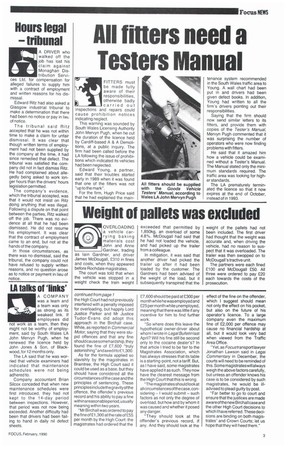IA talks of 'links'
Page 5

If you've noticed an error in this article please click here to report it so we can fix it.
A COMPANY was a team and a team was only as strong as its weakest link. If employees did not work as a team, then they might not be worthy of employment, said by South Wales LA John Mervyn Pugh, when he renewed the licence held by John Jones & Son, of Blackwood, for 12 months only.
The LA said that he was worried that vehicle examiners had indicated that maintenance schedules were not being adhered to.
Company accountant Brian Silcox conceded that when new maintenance schedules were first introduced, they had not kept to the 14-day period between inspections. However, that period was not now being exceeded. Another difficulty had been that drivers had been failing to hand in daily nil defect sheets. the High Court had not previously interfered with a penalty imposed for overloading, but happily Lord Justice Parker and Mr Justice Tudor-Evans did adopt this approach in the Birchall case. While, as reported in Commercial Motor, saying that they were stupid offences and that any fine shouldcausesomehardship,they found the fine of £7,600 "truly astonishing" andaxed itto £1,300.
As for the formula applied so slavishly by the magistrates in Braintree, the High Court said it could be used as a base, but they should have considered all the circumstancesof the case and the principles of sentencing. These principles incl udethegravity of the offence, the offender's previous record and his ability to pay a fine withinareasonableperiod,usually meaning within two years.
"Mr Birchall was ordered to pay the fine of £1 ,300 at the rate of £55 per month by the High Court: the magistrates had ordered that the £7,600 should be paid at £300 per month while hewasemployed and £25 per month while unemployed, meaning that there was little if any incentive for him to find further work.
"So where does this leave the hypothetical owner-driver about whom I wrote in Legal Bulletin last April? Will his fine still be second only to the cocaine dealer's? In that article I tried to be fair to the Magistrates Association, which has always stresses that its table is a starting-point, not a tariff. But, as I have said, some magistrates have applied it as such. They now have the clearest message from the High Court that this is wrong.
"The magistrates should look at allcircumstancesofthecase,considering — I would submit — such factors as not only the degree of overload, but how and by whom it was caused and whether it posed any danger.
"They should look at the offender's previous record, if any. And they should look at the effect of the fine on the offender, which I suggest should mean not only the effect on his pocket, but also on the future of his operator's licence. To a large company even the maximum fine of £2,000 per offence may cause no financial hardship at all, but it would look very bad when viewed from the Traffic Area Office.
"Yet, as Focustransport lawyer Jonathan Lawson said in Lep) Commentary in December, the courts will need to be reminded of this. Somemagistrateswillalways weigh the above factors carefully, but unless an offender knows his case is to be considered by such magistrates, he would be illadvised to plead guilty by post.
"Far better to go to court and ensure that the justices are made aware of the new Birchall case and the other High Court decisions to which I have referred. These decisions are binding on both magistrates' and Crown Courts; let us hope that they will heed them."




















































































































